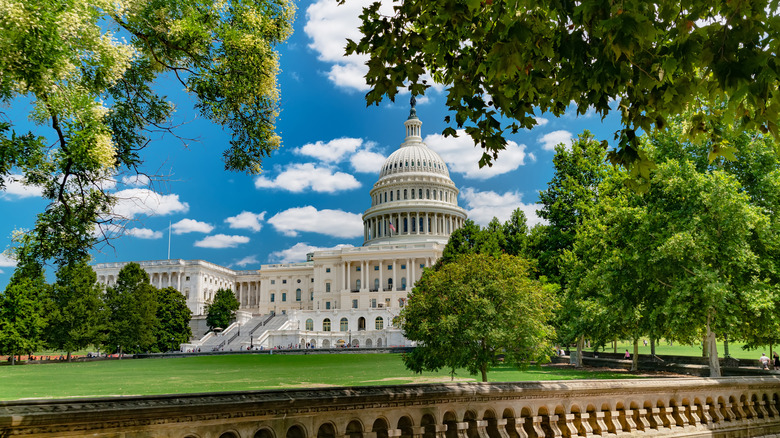The Nation's Capital Is Expected To Lose A Ton Of Money And Reason Couldn't Be Clearer
A recession is brewing in Washington, D.C. and while the District of Columbia may be home to Capitol Hill, national monuments, and world-class museums, it is currently suffering from political circumstances. With thousands of jobs on the line, a massive amount of local revenue is being lost. Per a 2025 analysis by the D.C. Fiscal Policy Institute, Washington is expected to lose over $1 billion in revenues over the next three years. The cause of this staggering projected revenue loss is clear: the district is projected to lose 40,000 government-related federal jobs over the next several years. So far, DOGE has already slashed many of these jobs in an attempt to save money (as well as by closing many Social Security offices), however the supposed "savings" that are meant to come from these cuts don't necessarily ring true, especially for Washington.
Per the Chief Financial Officer of the District of Columbia's latest revenue forecast, Washington has a chance to recover only about one third of this lost revenue through financial market capital gains and corporate earnings annually — or about $180 million. While the economy continues making the rich richer, many in Washington will suffer from these losses, with children in poverty being especially affected.
The impactful loss of 40,000 jobs
Despite Washington having wealthy enclaves, all income types live, work, and pay taxes in the city. However, by losing 40,000 jobs by 2029 — which the District of Columbia's CFO projects is more than 20% of the area's federal jobs — Washington also loses the revenue that could be earned from those 40,000 people spending in the area — not to mention their being able to afford taxes. Similarly, those 40,000 people may, in turn, need to rely more heavily on local social programs, which could further financial burden the district. Plus, these programs likely already have stretched budgets, even before thousands more people attempt to tap them for help.
At the same time, the Washington population is projected to remain stagnant for the next four years due to these labor market issues. Since Washington is largely a government town — with federal employees making up 25% of the district's workforce – the elimination of these federal jobs will have an outsized impact on the area.

